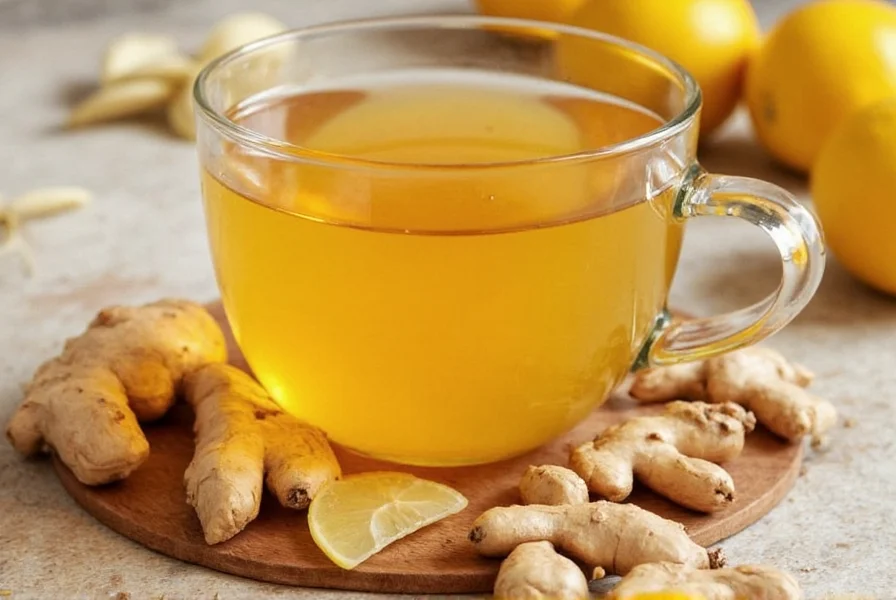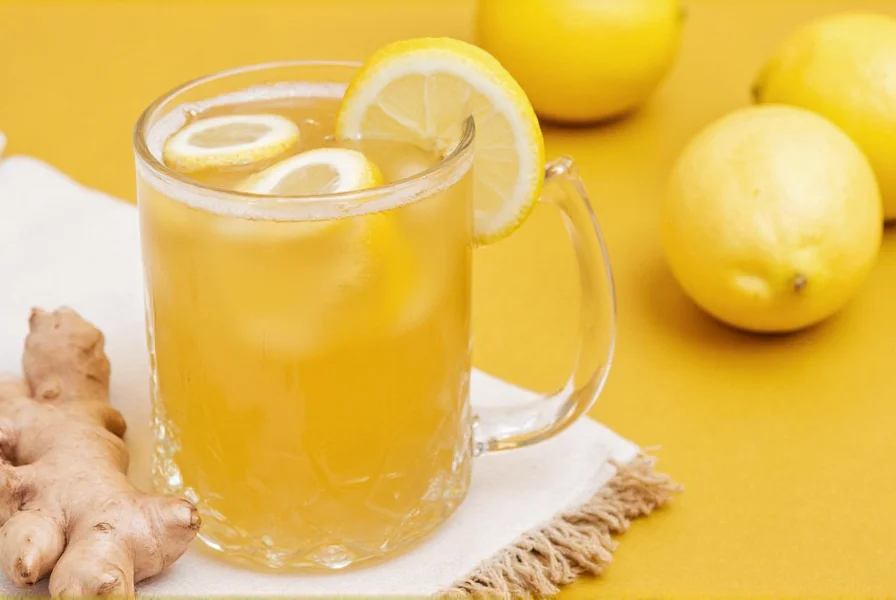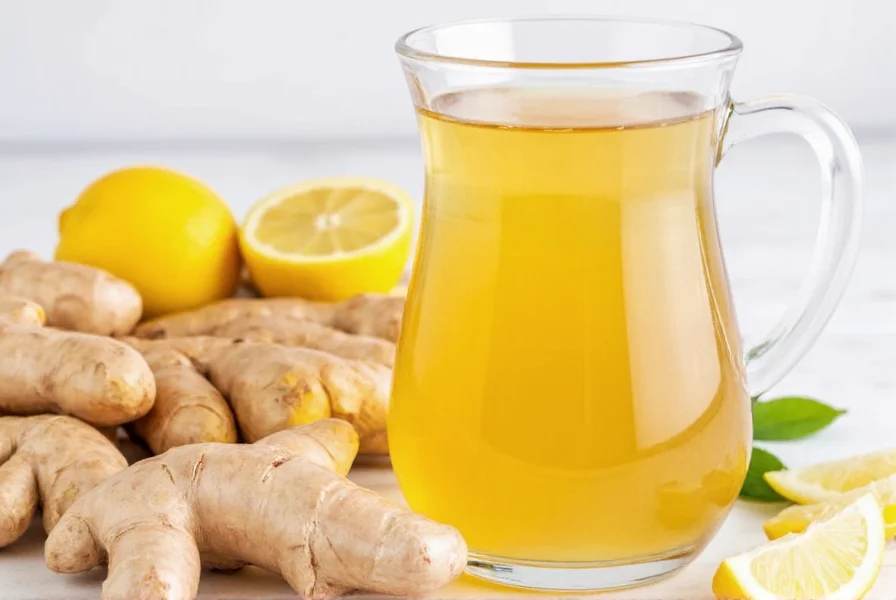For centuries, cultures worldwide have turned to ginger lemon and honey tea as a comforting remedy during cold and flu season. This simple beverage combines three natural ingredients known for their potential health properties. While not a medical treatment, understanding its actual benefits and limitations can help you incorporate it wisely into your wellness routine.
The Science Behind Each Ingredient
Ginger's Active Compounds
Ginger contains bioactive compounds like gingerol, which research suggests may have anti-inflammatory and antioxidant effects. A 2019 review published in Nutrients examined ginger's potential role in immune support, noting it may help reduce inflammation markers. When preparing ginger tea for cold relief, using freshly grated ginger provides more active compounds than powdered alternatives.

Lemon's Nutritional Profile
Lemons contribute vitamin C and flavonoids to this tea blend. While vitamin C doesn't prevent colds for most people, adequate intake supports overall immune function. The citric acid in lemon may also help break up mucus. For maximum vitamin retention, add lemon juice after the water has cooled slightly from boiling, as extreme heat can degrade some nutrients.
Honey's Properties
Honey, particularly raw varieties, contains antimicrobial compounds. The World Health Organization and American Academy of Pediatrics recognize honey as a potential remedy for cough suppression in children over one year old. Manuka honey has been specifically studied for its additional antibacterial properties. Remember that honey should never be given to infants under 12 months due to botulism risk.
How to Make Ginger Lemon Honey Tea: A Step-by-Step Guide
Creating an effective ginger lemon honey tea requires attention to preparation details. Here's a science-informed method:
- Peel and thinly slice 1-2 inches of fresh ginger root
- Simmer ginger in 2 cups of water for 10-15 minutes (longer for stronger tea)
- Remove from heat and let cool for 2-3 minutes
- Add juice from half a lemon
- Stir in 1-2 teaspoons of raw honey (after cooling to below 140°F/60°C to preserve beneficial compounds)
- Strain and enjoy while warm
| Ingredient Variation | Best For | Preparation Tip |
|---|---|---|
| Extra ginger (3+ inches) | Digestive support | Simmer 20 minutes for stronger concentration |
| Less honey (1 tsp) | Blood sugar concerns | Use after cooling to preserve enzymes |
| Additional lemon | Vitamin C boost | Add after heat removed to preserve nutrients |
When Ginger Lemon Honey Tea May Help (And When It Won't)
This natural beverage shows promise for specific situations:
Supported Benefits
- Cough suppression: Honey's texture coats irritated throats, with studies showing it may reduce cough frequency in children over one year
- Hydration: Warm liquids help maintain fluid intake during illness
- Temporary sore throat relief: The warm liquid and honey's coating effect provide comfort
Common Misconceptions
- It does not cure colds or flu (no beverage does)
- It won't significantly boost immunity with single use
- It's not appropriate for infants under 12 months due to honey content
Optimal Consumption Timing and Frequency
For maximum potential benefit:
- Drink 1-2 cups daily when experiencing cold symptoms
- Consume before bed to potentially reduce nighttime coughing
- Enjoy with meals if using for digestive support
- Avoid excessive consumption (more than 4 cups daily) due to ginger's potential gastrointestinal effects
Important Considerations and Potential Side Effects
While generally safe for most adults, ginger lemon honey tea may cause issues for some individuals:
- Ginger may interact with blood-thinning medications
- Excessive consumption could cause heartburn or stomach upset
- Honey adds natural sugars (consider reduced honey versions for diabetes management)
- Lemon's acidity might affect tooth enamel with frequent consumption
Consult your healthcare provider before using this tea regularly if you have medical conditions or take medications. Pregnant women should limit ginger intake to no more than 1 gram daily from all sources.
Evidence-Based Perspective on Popular Claims
Let's examine common assertions about ginger lemon honey tea through a scientific lens:
- "Boosts immunity": No single food or beverage significantly boosts immunity. These ingredients support overall health as part of a balanced diet.
- "Detoxifies the body": Your liver and kidneys handle detoxification. This tea supports hydration but doesn't enhance natural detox processes.
- "Cures colds": While it may provide symptom relief, no evidence shows it shortens cold duration.
- "Aids weight loss": No substantial evidence supports ginger lemon honey tea as a weight loss solution.

Conclusion: A Comforting Addition to Wellness Practices
Ginger lemon honey tea serves as a comforting, potentially beneficial beverage when used appropriately. Its value lies in providing hydration, temporary symptom relief, and the soothing ritual of preparing and enjoying a warm drink during illness. While not a medical treatment, it can complement standard care for minor ailments when prepared correctly and consumed with realistic expectations about its effects.
Frequently Asked Questions
How often can I drink ginger lemon honey tea when sick?
Most adults can safely enjoy 1-3 cups daily when experiencing cold symptoms. Excessive consumption (more than 4 cups) might cause digestive discomfort from the ginger. Allow the tea to cool slightly before adding honey to preserve its beneficial compounds, and always consult your healthcare provider if you have specific health concerns.
Can ginger lemon honey tea help with a sore throat?
Yes, it may provide temporary sore throat relief through multiple mechanisms: the warm liquid soothes irritated tissues, honey coats the throat reducing cough reflex, and ginger's anti-inflammatory properties might help reduce swelling. A 2020 review in BMJ Evidence-Based Medicine noted honey's effectiveness for upper respiratory tract infections, though it emphasized honey should complement rather than replace medical treatment for severe symptoms.
Is store-bought ginger lemon honey tea as effective as homemade?
Homemade versions typically offer more potential benefits than commercial products. Many store-bought varieties contain less ginger, added sugars instead of pure honey, and sometimes artificial flavors. For maximum benefit, prepare tea with fresh ingredients, as the active compounds in ginger degrade over time. If using commercial products, look for those with minimal ingredients and no added sugars.
When should I avoid ginger lemon honey tea?
Avoid this tea if you're an infant under 12 months (due to honey), have a known ginger allergy, or take certain medications like blood thinners without consulting your doctor. Those with gastroesophageal reflux disease (GERD) might experience worsened symptoms from the acidity. Pregnant women should limit ginger intake to no more than 1 gram daily from all sources. Always check with your healthcare provider if you have specific health conditions.
What's the best time of day to drink ginger lemon honey tea for cold relief?
Drinking ginger lemon honey tea before bedtime may be particularly helpful for cold relief, as the honey can reduce nighttime coughing. Morning consumption can provide hydration after overnight fluid loss. For digestive support, enjoy 20-30 minutes before meals. The warmth and ritual of tea consumption provide comfort regardless of timing, but strategic timing may enhance specific benefits.











 浙公网安备
33010002000092号
浙公网安备
33010002000092号 浙B2-20120091-4
浙B2-20120091-4